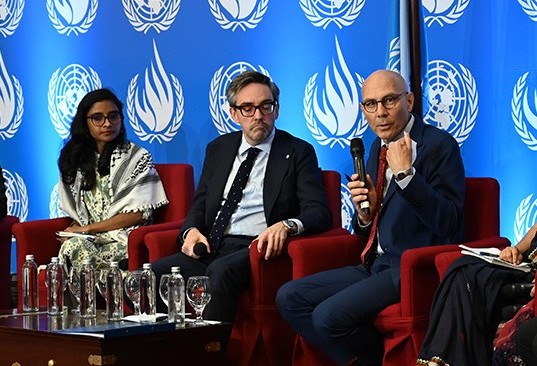Image: High Commissioner Volker Türk during panel discussion in Colombo, Sri Lanka. © Sophia Lindell / United Nations.
Calling it a defining juncture for Sri Lanka and the world, the UN High Commissioner for Human Rights issued a compelling call to safeguard international law and reaffirm human rights as the cornerstone of peace and justice. From the rich cultural landscape of Sri Lanka to crisis zones across the globe, the message was unwavering: only respect for human dignity can lead us out of cycles of violence.
UN High Commissioner for Human Rights, Türk, was speaking to an invited gathering in Colombo on 24 June 2025.
Excerpts:
A World in Crisis
The address opened with heartfelt greetings in Sinhala, Tamil, and Arabic, setting the stage for a message that resonated globally. As armed conflicts rage from Gaza to Ukraine, Sudan, and Myanmar, the High Commissioner lamented that international law is being undermined by glaring human rights violations and inconsistent global leadership.
Without respect for justice and dignity, “the strong do what they will, while the weak suffer oppression.” Such patterns, history warns, will echo through generations unless decisively addressed.
The Moral Core of Human Rights
Human rights are not a Western doctrine or legal abstraction—they are the moral compass shared by every civilization. Rooted in the Universal Declaration of Human Rights, they uphold the equal worth of every individual. Rights to expression, peaceful assembly, non-discrimination, and access to food, health, and housing are not privileges but guarantees for every human being—whether in Gaza, Israel, or Sri Lanka.
These are not just ideals—they are safeguards. Against tyranny. Against the erosion of society. They are the blueprint for “larger freedom,” as the UN Charter envisions.
Sri Lanka’s Promise and the Path Ahead
Emerging from decades of conflict, Sri Lanka exemplifies both resilience and challenge. Democratic institutions have withstood immense pressures, and universal education continues to shape a resourceful new generation.
Yet, two formidable traps threaten the country’s progress: *impunity* and *inequality*. To escape them, Sri Lankans must embrace human rights not as obligations, but as tools for healing and unity.
Global Lessons, Local Hope
Drawing lessons from Northern Ireland, South Africa, and Sierra Leone, the High Commissioner underscored that healing from conflict requires more than peace treaties. It needs truth, memorialisation, reparations, and—critically—accountability for perpetrators of serious crimes.
Justice is not only for the past. It is for deterrence. It is for the survivors. And it is for the future.
Continuing an impassioned appeal for accountability and human dignity, the recent remarks focused on the profound importance of truth, justice, and equality in reconciling deeply divided societies and building inclusive economies. In a time marked by global unrest and eroded public trust, the High Commissioner underscored a path forward rooted in shared humanity and historical honesty.
Truth Before Peace
To stop the recurring shocks of violence that leave communities fractured and nations destabilized, the speaker called for a collective reckoning with truth. Without acknowledging what truly transpired—massacres, disappearances, torture, sexual violence—healing is stymied, and historical revisionism threatens to glorify past atrocities.
Referencing Austria’s long-delayed confrontation with its Nazi past, the High Commissioner emphasized the moral necessity of facing even the most painful truths. “An absence of justice will undermine the stability of peace.” Conversely, genuine accountability clears the path for reparations and lasting reconciliation.
The Intertwined Web of Inequality and Instability
The High Commissioner then shifted to a second urgent challenge: the inequality trap. Economic despair not only deepens social rifts but creates fertile ground for corruption and extremism. The connection between social exclusion and violent conflict is undeniable—crises often stem from unmet economic and social rights.
Yet States have tools to reverse these patterns. By embedding human rights into economic policy, governments can foster equitable growth and social harmony. This means guaranteeing access to education, healthcare, water, sanitation, decent work, and social protection.
Crucially, such investments are affordable and attainable. As highlighted, a comprehensive social protection system would cost developing nations just 1.6% of their GDP. In a world still reeling from the COVID-19 pandemic, this insight could not be more timely.
Corruption and Reform: Facing the Hard Truths
States were also urged to confront corruption head-on—especially when it diverts critical resources from the public good into private coffers. The United Nations stands ready with programs to bolster governance and accountability.
Importantly, structural reforms in global financial systems are needed, including debt relief measures that would free up national budgets to invest in rights-based development.
Sri Lanka: At the Cusp of Change
With a 21-year history of engagement in Sri Lanka, the Office of the High Commissioner reaffirmed its steadfast support. In the years since the end of civil war, tangible progress has been made toward democratic accountability—but much more remains to be done.
The High Commissioner praised recent progress in increasing women’s participation in governance while underscoring that true reconciliation requires the inclusion of diverse voices—especially those of victims and historically marginalized communities.
Human Rights Are Not Foreign Impositions—They Are Your Birthright
A compelling reminder closed the address: human rights are not “sticks brandished from afar.” They are mirrors, sometimes uncomfortable, but always truthful. They reflect the aspirations of those who took to the streets during Sri Lanka’s 2022 Aragalaya movement, demanding a more just society.
The days ahead will be pivotal. But with bold leadership and an unshakable commitment to justice, Sri Lanka has the potential to model a different way forward—a society that turns from violence and builds peace through dignity, equity, and truth.
Full statement is here
